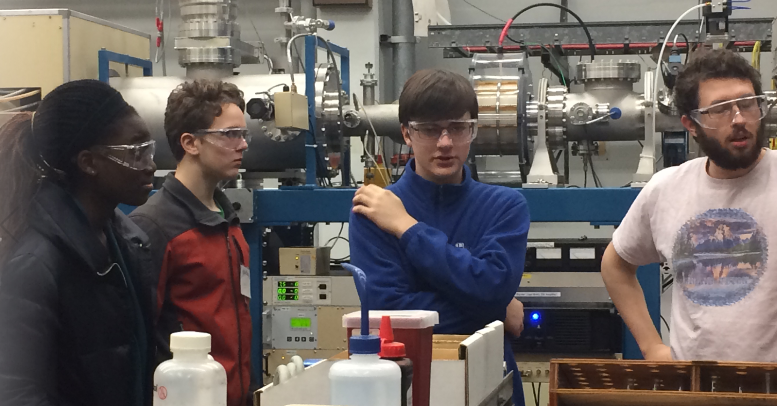Friday Flyer - March 1, 2019

Spotlight on International Masterclasses 2019
International Masterclasses (IMC) start next week! This year, there are 89 masterclass videoconferences scheduled at CERN and Fermilab. There will be 343 individual masterclasses around the world, including 32 connected with QuarkNet centers. Students will analyze data from four LHC experiments at CERN. This year, there is a new, exciting option: a masterclass using data from the MINERvA neutrino experiment at Fermilab. Next year, we plan to upgrade the CMS masterclass and perhaps add another neutrino experiment. QuarkNet produces the CMS and MINERvA masterclasses (with assistance and physics guidance from key centers like Notre Dame, Rochester, and Boston), organizes the Fermilab videoconferences, and supports ATLAS Z, CMS, and MINERvA masterclasses in the U.S. To learn more or disseminate more, download and then read/adapt and distribute the IMC 2019 press release.


News from QuarkNet Central
International Muon Week is coming up April 1-5. Student groups around the world will use their cosmic ray detectors to detect muons and, in their Speed Study, measure the average time it takes muons to traverse the measured distance between two scintillation counters. An international map will show participants and their results. Students can also participate in videoconferences during the following week to discuss their results. Teachers and mentors: Please register!
Don't forget: The 2019 Beamline for Schools (BL4S) competition at CERN is accepting proposals through March 31.
Have questions about masterclass vifdeoconferences? Need an ISO image to make a DVD for your measurement? Find out about these in the latest IMC circular, just out today. Orientations and updates for International Masterclasses (IMC) are well underway, so if you are not signed up, do so as soon as you can. Institutes doing MINERvA masterclasses especially need orientation since it is a new measurement. Register via Google form. Questions? Contact Ken for help.

Physics Experiment Roundup
While the LHC is shut down, let's take a look at what the future holds: CERN Bulletin informs us about the next two years of ATLAS and CMS. Fermilab Today, on the other hand, gives us a look at upgrades to the LHC.
And out with the old...Fermilab Today informs us about the fate of the Cockcroft-Walton that once began the Fermilab accelerator chain.

Resources
A little theory, a little philosophy: The New York Times takes an astro-cosmo-particle view of the dark forces that mess with our universe. Not to be outdone on going for the wilder shores, Physics Today queries theorist Carlo Rovelli on the physics of time. What does it all mean? Well, symmetry tries to help with ten words that have special meaning in physics.
The International Day of Wօmen and Gіrls in Science last month was marked in various ways. International Masterclasses held special masterclasses. Read in CERN Bulletin how CERN marked the day.

Just for Fun
If you've been around for awhile in QuarkNet, you might recall how we once made candy colliders. Well, Gizmodo reports that Swedish particle physicists have upped the ante with their meatball collider. These are Swedish meatballs, of course. Does the technology exist to accelerate and collide the more massive (and cheese-laden) Italian meatballs? Science.
QuarkNet Staff:
Mark Adams: adams@fnal.gov
Ken Cecire: kcecire@nd.edu
Shane Wood: swood5@nd.edu
